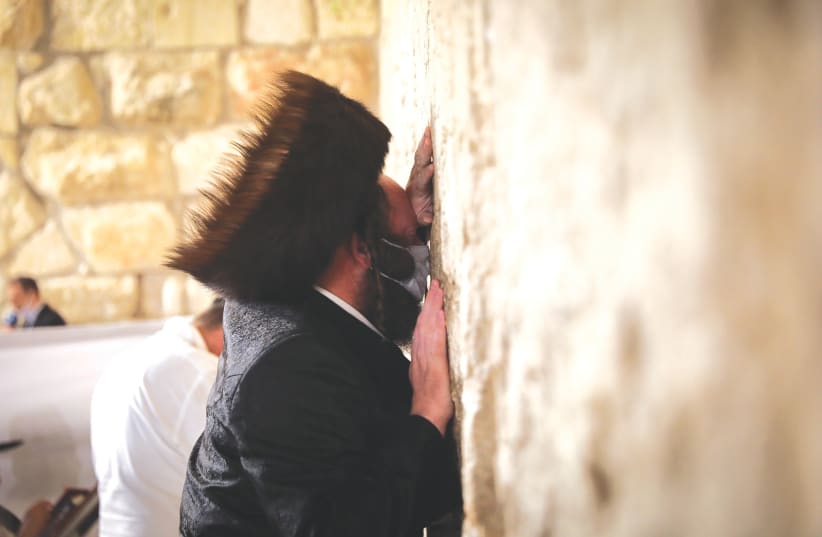Schver zu zein a Yid” – “It’s not easy being a Jew.” This was the escutcheon of the Jews of Europe before the Holocaust and, following that, the Yiddish-speaking Jews of America. I heard it from my grandmother many times over. The expression, always followed by a big sigh, was actually the title of a play written by Sholem Aleichem in 1920. The play premiered at the Second Avenue Theater 100 years ago, on October 1, 1920. It was revived again in 1949.
Sholem Aleichem’s work – surprisingly and ironically, was a comedy. It dealt with the relationship between a Jew and the non-Jewish environment. In this case, Russia. The play was a part of a theme that he developed in many of his other works.
The world of Sholem Aleichem and life in a shtetl in Russia is certainly a far cry from our lives today. But the poet, author and playwright was a visionary, and there are powerful messages in his work that are still relatable and still resonate in our Jewish lives today. Sholem Aleichem was his pseudonym. His parents named him Shlomo Nohumovich Rabinovich. He left Europe and moved to New York City in 1906, returning to Europe and bringing his family back with him in 1914. Sholem Aleichem is buried in Queens. Over a hundred thousand people came to his funeral, it was the largest funeral in the history of New York City until that time.
The most powerful of Sholem Aleichem’s messages probably come from a series of stories about Tevye the Milkman. It was those stories, later adapted into a hit play and blockbuster movie by Norman Jewison, that became the foundation of Fiddler on the Roof. In his works Sholem Aleichem dissected the interaction between Jews and their host country, the outside community. Jewison remained true to Sholem Aleichem’s themes. In Fiddler we follow the breakdown of traditional society and the family, illustrated by way of the marriages of the milkman’s three daughters. The first daughter marries without the aid or interference of the traditional matchmaker. The second chooses a revolutionary for her husband. Still a Jewish husband, but certainly a revolutionary. The third daughter intermarries to a nice, young Russian man.
The greatness of the Jewison story touched even the Japanese. Japan had no idea who Tevye was or what life in a shtetl was all about. And yet, they related to the story. And that was because it dealt with the breakdown of tradition. It dealt with the encroaching and appealing and challenging ways of the modern world.
All these years later, no matter where we live or how hard we try, there is no way to shut out the outside world. The Quakers can’t do it, the Shakers can’t do it and neither can the ultra-Orthodox of New York or of Israel.
It is a reality that is brought home to us with frightful intensity by the pandemic called COVID-19.
In the Diaspora, as in Israel, Jews are trying to make sense of the pandemic and the restrictions it imposes on our daily lives and rituals, especially as we observe the High Holy Days and Sukkot. In past years, I would have used the word celebrate, rather than observe. But this year, our celebrations are dimmed. They are muted both by the loss of life many families and every community has suffered at the hands of the coronavirus and because of the lockdowns – more justly lock-ins and locked-aways, being imposed on us in efforts to stop the spread of the virus.
The new year brings with it the end of one of the most difficult years we have ever experienced. But Tevye was right. Tradition will triumph. We have tweaked our traditions this year, but we have maintained them. And we have crafted memories, many of which we never thought we would have and never would have wanted.
One thing hasn’t changed. In fact, this year, it has intensified. The Jewish New Year is a time of introspection and self-knowledge. This year, we have so very much to think about, and given the restrictions in the way we celebrate, so much time to do that thinking. Rather than embracing the restrictions and accepting that they are put in place to help conquer this assault on our health and our lives, on our economies and educational systems and livelihoods, many people are fighting against them.
And that’s wrong. It’s deadly wrong.
Sholem Aleichem took tragic situations and turned them into comedy. One day, hopefully, we will be able to do that, too. Meanwhile, there is one story that is floating around. Many of its raconteurs swear that it is true – I hope it is not. I hope this is the beginning of our way of turning tragedy into comic relief.
It goes like this: A visitor walks into a synagogue. He looks around and sees that he is the only person wearing a mask, the only compliant person in the room. He feels awkward and doesn’t know what to do. Finally, he sees another man wearing a mask sitting alone at a table. At last, he thinks and walks over to that table. As he’s about to sit, the man turns to the visitor and says, “So, you have COVID, also?!”
No one said it will be easy. Remember, shver zu zein a Yid.
The author is a political commentator. He hosts the TV show Thinking Out Loud on JBS TV. Follow him on Twitter @MicahHalpern.
